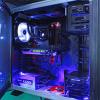Why doesn't water vapour in the air damage electronics components?
-
Featured Topics
-
Topics
-
jeremythelee ·
Posted in LMG Sponsor Discussion3 -
1
-
Hamborgor ·
Posted in New Builds and Planning4 -
Sai125943 ·
Posted in Graphics Cards3 -
zombiepunk10 ·
Posted in General Discussion3 -
Mechernsee ·
Posted in Graphics Cards11 -
8
-
FoxYolk ·
Posted in Graphics Cards8 -
11
-
Ridethehorse ·
Posted in Troubleshooting9
-







.thumb.jpg.41b364c91d47256e4c681dda232b92f9.jpg)


.thumb.jpg.2d9f94eef978a5991ceb131700de9a3f.jpg)









Create an account or sign in to comment
You need to be a member in order to leave a comment
Create an account
Sign up for a new account in our community. It's easy!
Register a new accountSign in
Already have an account? Sign in here.
Sign In Now